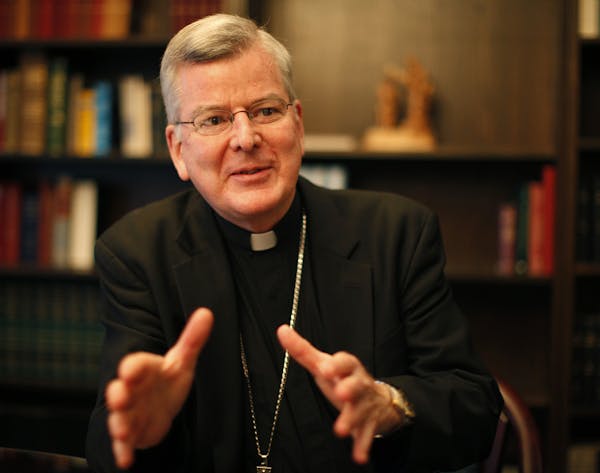A church tribunal that determines the sensitive issue of whether Twin Cities Catholics can annul their marriages has employed priests known to have engaged in sexual improprieties, according to church documents and other records obtained by the Star Tribune.
The practice is defended by the church but challenged by others who say the church is finding jobs for problem priests at the expense of Catholics in crisis.
The Rev. James McConville, a Metropolitan Tribunal judge since at least 2009, was sued for sexual harassment by a female staff member at St. Peter's Church in North St. Paul in 2004 and placed on restrictions by the archdiocese.
The Rev. Daniel Conlin was the chief judge when he fathered a child with a married church employee in 2004. He left the tribunal later that year, but returned for a period from at least 2011 until 2013.
The Rev. Joseph Wajda joined the Metropolitan Tribunal just months after settling one of two child sex abuse lawsuits in 1991 involving boys at his churches. He was chief judge and administrator when he left in 2002.
Other priests accused of sexual improprieties also have served on the tribunal of the Archdiocese of St. Paul and Minneapolis over the years, giving them access to sensitive information on everything from couples' therapy reports to their sex lives. Their judgments on marriages can determine a Catholic's good standing with the church.
"It's like putting the guys who flunked out of medical school into the ER," said the Rev. Tom Doyle, formerly a canon lawyer at the Vatican Embassy in Washington, D.C., and a Chicago archdiocese tribunal judge.
Doyle, a well-known victims' advocate, said it is "an absolute violation of canon law" for such priests to serve on the tribunal, since the judges are supposed to have an "unimpaired reputation." But as the archdiocese faces a growing number of clergy offenders who are supposed to be barred from public ministry, administrative jobs have become one of the few places they could serve, church officials acknowledge.
The archdiocese says its judges meet church standards.
" 'Unimpaired reputation' is in reference to the judge's objectivity and impartiality in judgment, that is, the judge is not for sale," wrote the Rev. Timothy Cloutier, judicial vicar for the archdiocese, in an e-mail.
Cloutier defended the practice of putting the accused priests on the tribunal.
"It involves little, if any, interaction with the lay faithful, other than lay employees," he said. "It can be considered a good means for a priest to provide a meaningful contribution to the needs of the Archdiocese when other ministerial work is not an option."
The practice is not unique to Minnesota, said Patrick Wall, a former priest who served on the tribunal and now works with Jeff Anderson & Associates law firm representing abuse victims. Priests found to have committed child abuse served on tribunals in Los Angeles, Boston and Tucson, Wall said.
About 500 annulment requests were reviewed by the Metropolitan Tribunal in 2012, according the Canon Law Society of America's most recent annual report. Last year, the judges made decisions on 176 cases; 24 percent were denied — the third-highest denial rate in the nation, the report indicated. Nationally, about 4 percent of requests are denied.
Why an annulment?
The Catholic Church does not recognize divorce. An annulment is a church declaration that the marriage — as defined by the church — never existed. It frees up the former spouses to remarry and receive communion and other sacraments in good standing.
About 6,000 Twin Cities Catholics have sought marriage annulments in the past decade, according to Canon Law Society reports. Others have explored the option.
The ex-husband of the woman who became pregnant with Conlin's child is one of them. About two years ago, he perused the archdiocese's website to learn more about the annulment process. He was astonished when he clicked on the tribunal staff page and found Conlin's photo and biography.
"Anyone with a conscience knows that's wrong," said the man, who did not want his name used in this story. "Also I feel bad for the people seeking annulments, not knowing of his past wrongdoings. I certainly wouldn't want someone judging my marriage who broke his vows and destroyed a marriage."
The archdiocese also has paid for some of these priests to receive canon law degrees, said Jennifer Haselberger, a whistleblower who exposed the archdiocese's handling of abusive priests. Wajda, for example, was sent to Catholic University in Washington, D.C., in 1992, within a year of the settlement of a child abuse case, according to church records obtained by the Star Tribune.
Wajda then served as a tribunal judge, and ultimately chief judge and administrator, from 1995 to 2002, church records show. He was permanently removed from ministry the following year and is on the archdiocese's list of credibly accused priests.
McConville received a degree from Catholic University in 2006, the same year the archdiocese settled a lawsuit that accused him of sexual harassment at St. Peter's. The lawsuit said that McConville made repeated sexually offensive remarks and comments about masturbation and told dirty jokes about nuns and priests, legal documents show.
The Rev. Joseph Gallatin, who was removed from ministry in December at the Church of St. Peter in Mendota because of a "boundary violation" with a sleeping teenage boy on a 1998 mission trip, also was slated to attend Catholic University, but the archdiocese said it canceled the assignment after a victims' group reportedly contacted the university. Cloutier said underwriting canon law degrees allows the church "to make use of a cleric who would be able to serve the Archdiocese validly in another capacity."
Wajda, reached for comment at his Minneapolis home, said he believed he "did good work" on the tribunal and denied any sexual misconduct with youth. McConville did not respond to requests for comment, but Cloutier called him a "priest in good standing with the church." Conlin did not respond to requests for comment.
Whistleblower enters scene
Haselberger was a judge on the Metropolitan Tribunal from 2004 to 2006. She said in a court affidavit that it was her first window into the archdiocese's efforts "to conceal … the potential criminal acts of sexual misconduct … and the injurious nature of that concealment."
Haselberger wrote that she was distressed by then-Archbishop Harry Flynn's decision to appoint Conlin to a position that "involved the supervision of female staff, and … would bring Reverend Conlin into contact with more vulnerable women experiencing marital distress."
Archbishop John Nienstedt reappointed Conlin, she said.
"It places the interest of the priest over the interest of the Catholic community," Haselberger said in a recent interview. "Here you have two men who offended against their own employees … That tells you about their conduct in office, their ability to manage people … their general suitability for office."
Haselberger added that annulments aren't just sought by divorced Catholics seeking new lives. She recalls a longtime couple with one partner dying, who wanted to set themselves right in the eyes of the church before it was too late.
Petitioners share their sexual infidelities, physical abuse, substance abuse and other painful life stories, she said. "It's a process that really exposes people to a large scrutiny, that requires them to be treated with dignity and respect."
Over the years, the tribunal judges and staff also included the Rev. Dennis Kampa and the Rev. Paul Palmitessa, both on the list of credibly accused priests released last year.
Doyle said such hiring practices reveal "another dimension of the sex abuse saga."
"It points to the lack of comprehension by the institutional church of the horrendous and complex nature of abuse," he said.
Jean Hopfensperger • 612-673-4511
Brooklyn Park police make arrest after asking for help in search for man suspected of sexual assault at gunpoint

Attorney Tayler Rahm wins GOP backing in battleground Second District
North Oaks withdraws request for density exemption from Met Council

